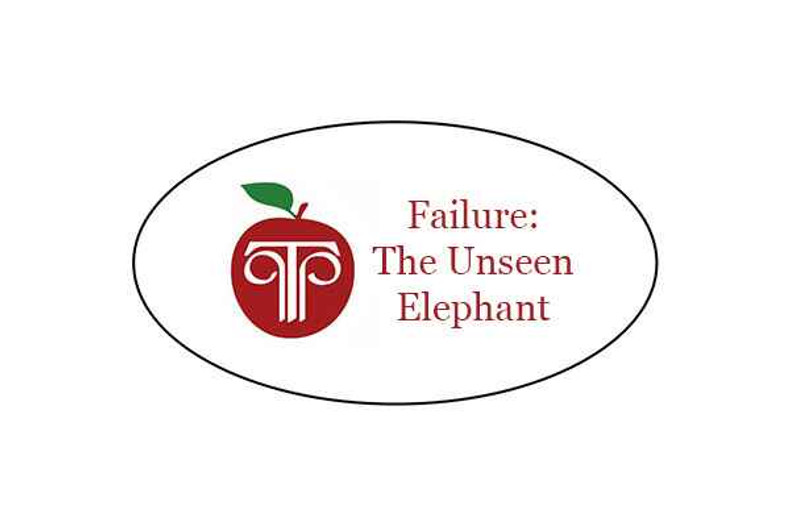I once read that failure is the mother of success, and there's a lot of truth in that. Ask any inventor. Ask any scientist. Ask any successful business person. Ask just about anyone, and they'll tell you that they have learned from their mistakes and failures. So why in education do we bend over backwards and do anything in our power to keep students from failing?
It seems to me that failure is a cornerstone of learning, yet we remove that cornerstone to keep students' self-esteem up high. The truth of the matter is that students know when they fail, even if we don't call it failure. Students's self-esteem is actually improved when they try, fail, try again, then succeed. There is no self-esteem-building going on with meaningless awards, meaningless grades, and meaningless "success."
Failure is a natural part of learning, thinking, and creativity. We have such a success-driven society that failure of any sort seems unacceptable from the moment we are born. We have to be the best, the "right" ones, the winners, the perfect ones. Perfect attendance. Perfect grades. Perfect hair. Perfect clothes. Perfect teeth. The perfect job. The perfect house. Well, guess what? We have a lot of people who perfectly don't know how to think, who perfectly do drugs to escape the pressures of having to be perfect, and who commit suicide because they can't stand the pressure. They've never learned that failing is simply a part of life, a part of success, and is perfectly okay.
In school, in our novel units, in our writing units, in our everyday classes, we should begin teaching students how to learn from failure, how to recover from it, how to view it as a stepping stone rather than the end.
We should stop pressuring students to be perfect all the time. That doesn't mean we lower our expectations or our standards or our goals. In fact, raising them a bit might be a good thing. The difference is in how we treat the process.
No one will ever be perfect; that's just humanity. That being said, we can strive for perfection in a thoughtful and reasonable way instead of expecting we must achieve it in everything we do or live in abject failure. The emphasis should be on the process of learning, the joy of learning, the acceptance that failures will happen--but that the important thing is to hop up and try again using the knowledge one gains from the failure as a stepping stone.
Our students have problems with failure on both ends of the spectrum: fearing failure and accepting failure. Most of our "great" students fear failure. Most of our "worst" students accept failure. Here's what I think:
I think college counselors in our high schools (and parents also) put too many expectations on our college-bound students. Everyone must have straight A's and a perfect resumé to get into the perfect college of choice. Kids are pushed and told that failure to achieve the best SAT scores will ruin their lives. That's all baloney. Any student who wants to learn and go to college can get into a community college, go there for a couple of years, work hard and get good grades, and transfer to a four-year college. But kids are forced to kill themselves studying and prepping and making perfect resumés, joining every club and sport and civic project in sight to make their resumés look perfect. Failure anywhere along the way is unacceptable. They fear what will happen to them if they "fail." The fact is that in most cases, it doesn't matter where you go to college. So why do we pressure our students so much? There are a lot of reasons (and not many of them are good), but that's another blog post. It's just wrong.
On the other end of the spectrum, our "other students" (those who can't or don't want to go to college), are treated like second-class citizens. Most of them have "given up" on school; they're coming to class because they have to,not because they expect anything good to happen for them there. They already accept that they are failures and don't bother trying anymore. They know they'll barely pass each year with mostly Ds. Maybe a C or two. Probably fail a couple of classes that don't really matter, and so what. They do drugs and get into trouble because they have given up on ever being anything but failures. No one has taught them how to use failure as a pathway to success; we have let the failure elephant squash their hopes and dreams.
So what's the solution? There isn't an easy one, because the failure elephant is a cultural thing, not just a school thing. But we can start to lift the elephant in our classrooms.
Let's focus on the process and joy of learning rather than stressing out our students. Lets focus on showing them how to live a more relaxed and balanced life, with time for thoughtful reflection, time for learning from failure, and time for enjoying the process of learning (yes, including failures) and living. That doesn't mean everything has to be warm and fuzzy with no standards or expectations; it means keeping standards high and helping students to achieve those standards by teaching them how to deal with failure rather than leaving it as the elephant on their backs.




